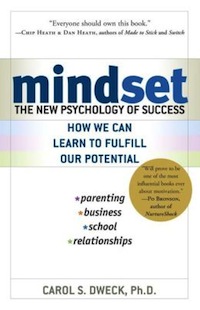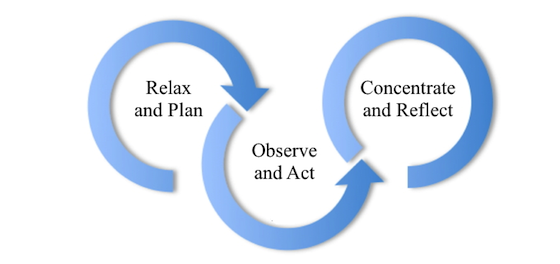The Importance of Being a Mindful Co-Teacher
A MiddleWeb Blog

For some teachers it’s a time to forget about the ticking of the classroom clock or the bells ringing to indicate the end of one period and the beginning of the next. Or the rush of making our way through congested hallways as students and teachers hurry to their next class like rats in a maze—always on the move—just trying to make it to a desired destination without bruising.
Some teachers achieve this rejuvenation by taking a vacation to the Bahamas, or hiking out West, or visiting some other exquisite spot on Earth. All good and necessary. Many of us also find some time to re-energize through activities that strengthen us professionally.
Living out a professional dream
My rejuvenation this summer came in the form of weekend travel trips and some well-needed quality time with friends and family. In addition, I was revitalized by the opportunity to live out a dream and a vision that I shared with some colleagues and forward thinking administrators.
My district launched a summer program called the Smithtown Resiliency Program C.A.M.P. One focus was to provide students with additional practice with ELA and math Common Core curriculum.
But the main focus was on naturally embedding a growth mindset and Social Emotional Learning experiences that will help students become more strategic, mindful learners.

The experience was just plain amazing! I’m pretty sure by now you’re starting to see why our “summer camp” refreshed and rejuvenated my teacher self— far better than any Caribbean cruise!
Why and how we decided to to this
For years administrators in my New York district discussed ways to support struggling middle school students who were failing core subject areas and being socially promoted year after year. Questions such as, “After years of failing, how can we expect these students to suddenly pass Regents level courses?” arose.
Ideas emerged to possibly end social promotion and retain students who did not attend a traditional summer school program. But thanks to the vision of our district’s Assistant Superintendent for Instruction and Administration, Jen Bradshaw, the search for a more innovative solution arose.
As a result of collaborating with colleagues, Jen began to synthesize these ideas. Several people played key roles, including Dan McCabe, Assistant Principal at one of our middle schools. Dan provided Jen with the research to support that retention just doesn’t work. In addition, he’s the kind of visionary collaborator that every district needs in order to do what’s right for students. If you’re on Twitter, check him out: @danieldmccabe—follow him—and be prepared to be inspired!

With all these research-based perspectives in play, our four-week program turned out to be a mind-opening experience for teachers, for students, and for the parents who became involved. It’s a work in progress, but the seeds are firmly planted thanks to our summer session, and I’m looking forward to following through on our next action steps.
Our own mindfulness was an important focus
Part of our summer program was driven by the concept of mindfulness. Josh Hendrickson led the group in daily self and group “check-in” sessions.

Our group shared personal connections and reflections on past experiences that opened the floodgates of emotions (yes, we had plenty of tissues on hand!) as well as opening the doors of communication for deeper professional collaborations. What resulted was a greater sense of self for each teacher, a closer professional relationship between and among teachers, and ultimately, more effective instruction for students. Seriously, this was magical stuff!
Applying mindfulness to co-teaching
Regular readers of this blog won’t be surprised to learn that as I reflected on the outcomes of our district’s summer program, I immediately made connections to the value of mindfulness for co-teachers.
1. Take time to relax and plan. We all know how finding the time to plan can become a daunting task, but don’t get bogged down by this reality—go with it—after all it is a natural part of the teaching process. Make the time to check in with yourself. Sit quietly and listen to your feelings. Allow your silent thoughts to become a proactive voice, so you can pave the way for effective, ongoing communication with your co-teacher(s). Find time to check-in with each other. Share personal experiences as well as allow your instructional planning time to flourish.
2. Take time to observe and to act upon your plan. Honor your set plans, but be flexible in the teaching moments and allow for authentic learning to happen. Each co-teacher should value the thinking of the other and take a stance to observe and allow the expertise of each teacher to find its way naturally in the process of instruction and assessment. If (and when) one co-teacher oversteps in a manner that threatens a power struggle, the other teacher should respond thoughtfully in a manner that stays consistent with your set plans.
In addition, both teachers should make sure to observe the learning behaviors of their students—and provide opportunities to value students’ thinking and encourage student voice. Both teachers should stay focused on what’s right for students. Co-teaching should never be about competing with one another. Co-teaching is always about strengthening the total experience so everyone has access to deeper levels of learning.
3. Take time to concentrate and to proactively reflect. A natural part of the mindfulness process is about concentration. Make sure you stay focused on your goals and students’ needs so that all learners can meet higher expectations and each student may achieve a personal best. Do not spin your wheels on glitches that will get in the way. Stay focused—stay proactive. Continue checking in with each other during the lesson. This ongoing check-in process helps assure that both teachers have maximum opportunities to nurture students’ growth mindset and positive attitude toward learning.
Not convinced of the power of mindfulness? Check out this New York Times article.
How might you incorporate mindful co-teaching this year?
































Elizabeth: A wonderful job explaining the summer program! Is there a way to follow the students to see the longitudinal effects of the program? Would love to know how they do during the regular school year.
Hi, Ruth–you are right on! For this experience to be really meaningful, there must be follow-up. Plans are in the works. I hope you enjoyed a smooth launch to the school year. Thanks so much for sharing your voice here!
Hello again Elizabeth – and welcome to a new school year. This is Dr. Pete Post at Trinity Christian College and I am excited about having my new students in SPED 315 take a look at your blog. Almost all of these students will be doing service hours by working with teachers in special education classrooms and I always appreciate your sage advice (and research based facts) on the co-teaching model. Thanks so much.
Welcome back, Dr. Pete Post! I am looking forward to the conversations–enjoy the semester!
Hi Elizabeth,
This is Martin Johnson, a junior from Trinity Christian College. I am an Elementary Education major and a Special Education minor. I really enjoyed this article, and I agree with a lot of it. I think that it is very important that teachers, especially ones who co-teach, need time to be mindful. I think that a lot time, some teachers that think everything is going okay with their co-teacher, but yet things are not, are the ones who need to do this. It brings new insight and assurance that both teachers can move forward and serve their students to the best of their ability. That is what teaching is about, serving and helping kids learn in the hopes that they will be ready to face the future, while also helping each other!
Hi, Marty, thanks for sharing your voice! You make a great point that both teachers need to move forward with a focus on guiding student achievement. And it is so important for both teachers to remain learners themselves. And the best part is the on-going collaboration along the way! All the best!
First of all, at the end of the third paragraph it should say through, instead of though. Sorry, I can’t help but catch type-Os.
Secondly, I enjoyed the beginning of your article that talked about your summer program. I have personally witnessed the benefits of staying involved throughout the summer, even if you are not a weak student, to help retain your current knowledge and build upon it in a unique way. My mom always had my sisters and I read a lot and do math books during summers growing up and I found those to be extremely helpful. I came to love reading, and naturally associate it with summer afternoons and trips to the beach and it is something I still do. I appreciate your commitment to helping other students further their knowledge and become better students so they can get back on track once the school year started up again.
Hello, Elizabeth! I am an Elementary Education and Special Education Double Major. As of yet I have no experience co-teaching so as of now I am taking this article as instructions to live by when I reach that stage. The spirit of collaboration rather competition while co-teaching especially resonated with me. I also found truth in not dwelling on the glitches. Overall, this was a fascinating read.
Thank you for your insights! Best of luck in the future.
Elizabeth,
Thank you for your insights into this summer program and co-teaching. I have not had much experience with either thus far in my life. I love the idea and passion that this group has formed in the summer program. I think it is awesome that teachers are so in love with learning that they will give up a trip to somewhere warm, just to spend more time with children and helping them maintain knowledge throughout the summer!
Something I wish I would have been more involved in growing up would be summer school and extra reading in the summer. My parents never encouraged this at my house, so I never really did it. I wish there would have been a program like yours that could have helped me. I truly think it would help.
Last, I find it interesting hearing about how much you rely on breathing exercises, relaxing, and taking time for reflections. Life in education can be chaotic at times, well, most times, so it is very ideal and difficult to find time for such things. It is a good reminder to stay relaxed and set aside time to reflect and plan.
Thank you for your insights.
Jessica
Hi Elizabeth,
Thank You for your tips on effective Co-Teaching, I’m a Special Education major at Trinity Christian College and I know in my future as a educator I will be working with a variety of professionals. I like that you address that teachers should relax and find time to plan together, I feel it is also important for educators to talk about their teaching styles and how they plan on teaching the class because there are several models of co-teaching as I have learned in my studies. I also liked the tip about checking in and reflecting with each other about how the lesson is working or if you might need to change things up. I found it interesting that your group leader had you do breathing exercises that helped you release tension and ease your mind to begin the thought process. I find that this technique could also be helpful for students to use in the classroom and I will be adding this to my “Teachers Toolbox”. Thank You for sharing your experiences and tidbits with us- Ann
Elizabeth, my name is Ashley Olson and I am a senior at Trinity Christian College. I am a special Ed and Elementary Ed double major. I enjoyed reading and reflecting on your article. I especially liked what you said about being mindful and how it helps you focus on teaching, collaborating with other teachers, and providing better instruction to the students. I also like what you said about, when working with a co-teacher, it is important to keep in mind that you are working together to do what is best for your students.
Thank you,
Ashley
Hi Elizabeth!!! I am an Elementary Education Major and a Special Education Minor. I enjoyed reading your article, especially about how you got your summer program started. That was interesting to read. I also love the co-teaching tips you had to offer. I like when you talked about valuing the other teacher’s thoughts. It is important to hear what they have to say. They may share some good ideas or strategies you could use in a particular lesson. If you don’t listen or value what they share, you won’t be able to accomplish anything, and most importantly, get along. Getting along is a key factor in co-teaching. You and your co-teacher are equals. One doesn’t have a higher status than the other. Competing to see who has a “higher status” is dangerous. It isn’t worth it. You have to be open-minded and willing to get along for the sake of the students. Thank you so much for your insights.
I am so glad to hear about another successful summer school experience! I am an art and special education major, and have a feeling that I will probably be part of summer school for many summers to come. (Maybe even summer art programs? That would be exceptional!) As a student, I know I dreaded going to school in the summer, but it seems that you came up with an interesting way to leech the dread away from summer school by making it into a C.A.M.P.! :)
My father was a high school teacher and was a primary mover in starting up a summer school in his own school, Shiprock High in New Mexico. He has often said it was one of the best experiences of his life, which I’m only starting to understand–however, your experience coincides with his.
From both of your experiences, I gather it is the relationship to colleagues that makes or breaks the experience. I know he a had a core group of teacher friends/supporters that helped make the summer school a reality, and it seems that you too had an excellent experience with your own colleagues. However, intentionality about this experience is something I have never heard about. I really appreciated this insight into how to really connect with the people you are working with, and I wouldn’t wonder if this connects to other areas of life as well!
–Hannah
Elizabeth,
Thank you for your article. It is really inspiring to hear about your summer and how you spent it working with kids when you work with them all year and were still refreshed from it. I really found everything that you have written about inspiring and something that i will reflect on. I currently want to become a paraprofessional and i would be working with the teacher in the classroom. It is inspiring to hear how to go about co-teaching to both work together to benefit the students to help them grow academically and emotionally. Thanks for your article and your passion to work with students.
-Paige
Elizabeth! Hi!
As a student studying special education I absolutely loved this article. First of all, I am a lover of the language arts and absolutely love writing. I must commend the hook at the beginning of this article. Absolutely excellent! I also really loved the “Check in” ideas. Teaching is hard work and while most educators believe it is well worth the sweat and tears taking time to breathe and reflect with your fellow teachers can help wind down from the stress and remind us that we are not alone. A strategy like this would be incredibly helpful in the classroom as well. Taking just a few moments to breathe and check in with the students at the beginning and end of the day could really benefit their learning experience. Learning is hard work, too. One last thing I would like to highlight is the diagram you posted to support the application of mindfulness. Breaking everything down into those three steps makes work far less stressful. Again, it’s a great strategy that can be used in the classroom to encourage students with their own work. It was such a pleasure reading this article. Thank you so much for your insight!
-Sam Rodriguez
Hi Elizabeth,
Thank you for this great article. I thought it was really inspiring how you worked throughout the summer with your students. That takes a lot of dedication and I am sure the students appreciated every moment of it! As I read this, I was imagining myself in my future classroom and I thought “I could really use these insights because they could be extremely helpful to not only me, but especially my students.” Thank you for writing such a great article!
-Emily
Hello to All! It is always so refreshing to hear the connections and insights of the students in Dr. Pete Post’s class! I hope you all continue to be a reflective teacher as you deepen your studies and eventually enter into your own classrooms!
You each capture the value of mindfulness and collaborating as anchors to effective teaching in such a unique way. I wish you all the best. And I hope you continue to visit my blog and share your voice! In addition, check out other amazing resources at MiddleWeb’s homepage–it’s such a wealth of information for educators!
All the best!
Hi Elizabeth,
Thanks so much for your great article. I enjoyed reading it and hearing your thoughts. I especially enjoyed your section on taking time to reflect and breath before meeting with children and after meeting with children. I have found, in my experiences, that taking time to yourself at the beginning and end of the day is especially important. I like that you shared that it’s important to take that time to yourself and simply get back into the right mindset before or after these sorts of meetings. I also enjoy the fact that you write about taking this time with another professional who can help you calm down and discuss the day with you. I find that this type of collaboration can be very important.
All in all, thank you for this article and the insights!
Leah
Hello Elizabeth,
My name is Michelle Covarrubias. I am a senior at Trinity Christian College, and I am in Dr. Post’s SPED 315 class. I really enjoyed your article! I had actually never read anything about co-teaching before, and, as a concept in general, it is quite new to me.
Not until this year did I even experience co-teaching. As an ESL minor, I am required to take a class called Issues in Multicultural Education (the actual name is “Multicultural Issues in Education,” but I do not like the way that sounds because it makes it seem like multiculturalism is the issue). This class is co-taught by two female professors who work in the Adult Studies Department: Dr. M. and Dr. V.
I had Dr. V. for a class last semester, but I hadn’t been familiar with Dr. M. until a few weeks ago. I was really excited to get to know her. Unfortunately, her colleague has not allowed my classmates and me to fully get to know her, even though Dr. M’s name is the one that appears on our syllabus…
It is very interesting to watch these two professors interact, because I know that they are really good friends, but I actually think that that makes it more difficult for them to successfully co-teach. Dr. V. really loves to talk, and so she sometimes ends up teaching a majority of the time, leaving Dr. M. to feel agitated (at least she looks that way).
Through observing these two grown women interact, and sensing all of the tension in the air, it has become very apparent to me that co-teaching is really quite the challenge.
I appreciate that you so clearly lay out the three main components to keep in mind when co-teaching.
Finding time to check in with one another is so beneficial! If there is hostility between the two teachers, (say because one teacher disregards what the other has to say, or because one teacher takes up all of the instruction time) the only way they could fix the issue would be by bluntly discussing what happened.
If neither teacher feels like she can be open and speak up when something in class did not go as she would have hoped, then the two will not make a good team. Consequently, the students will not be taught very well.
The second point you bring up also includes some very useful notes. I completely agree that learning must occur authentically! If it does not, the students will find school irrelevant and useless; they will never see the connections between school and “outside life.” It is very true, too, that co-teachers must value the thinking of one another. If Teacher A always thinks that her ideas are better than those of Teacher B, and she never lets him try out a strategy of his own in class, Teacher B will likely harbor negative feelings toward Teacher A. Then, of course, they will not interact well while teaching in class.
Especially if the students notice that one teacher is always demeaning or belittling the other, they will be hesitant to offer answers, or contribute to class conversations. We want to “value students’ thinking and encourage student voice,” but co-teachers cannot do this if they are focusing on cutting each other off, and outshining one another. It takes effort to encourage student voice, especially as students grow older, because participating in class becomes so “uncool.”
The last point you made—to stay focused on your goals and students’ needs—“ is essential! While we might assume that we could never lose sight of our goals, it can become very easy to do so when our minds get caught up with so many other thoughts and responsibilities. When co-teachers forget that it’s about the students, not about them, they do not do their jobs well at all.
But just as you mentioned, the point of co-teaching is for two professionals to collaborate and run a class very smoothly and effectively—not for two adults to compete to say the most, or do the most.
Not only did I find your blog entry valuable to myself, but I just might think about discretely passing it on to Dr. V and Dr. M so that they can become better co-teachers! Thank you very much for your words!
-Michelle